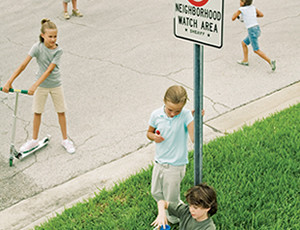How safe do you feel in your neighborhood? Unfortunately, residential crime happens more often than you might think, which leaves many homeowners feeling uneasy. But there are steps you can take to protect your home and your neighborhood. One of the best preventive measures you can take is to simply get to know your neighbors.
A national poll by Nextdoor.com, a free and private social network for neighborhoods, found that 67 percent of homeowners feel safer in their home and neighborhood because they know their neighbors. In addition, 76 percent said they thought their neighborhood would be safer if they communicated more with neighbors.
“The single most important thing you can do to create a safe neighborhood is to get to know your neighbors,” said Matt Peskin, director of the National Association of Town Watch (NATW), a nonprofit dedicated to community crime and drug prevention. “People who know each other look out for one another. And now with online tools making it easier, there’s no excuse not to connect and communicate with those who live around you.”
Nextdoor has partnered with NATW to expand its efforts around community-based crime prevention. Here are their tips for creating a safer neighborhood:
- Create a neighborhood watch online and off. Host an in-person meeting to discuss how to communicate with neighbors in emergency situations or organize foot patrols. For daily vigilance, use an online tool, like Nextdoor.com, to share urgent alerts or safety tips.
- Keep the neighborhood clean. A clean neighborhood is a deterrent for criminal activity. Organize volunteers to pick up litter, cut grass and hedges, and make property repairs. Make efforts to beautify vacant lots with a community garden or flowers.
- Turn the lights on. Keep a dim porch light on all night to discourage crime. Encourage others to do the same. Consider also leaving an interior light on when gone for the evening or longer.
- Update your home security. Ensure all exterior doors have deadbolt locks. Lock all windows and connect them to your home alarm system. Shut and lock gates and garages to reduce hiding places. And keep ladders in a locked garage or shed.
- Get to know the police. Make an effort to meet your neighborhood officers. Report questionable behavior or activity in your area. Attend or help organize an event, like National Night Out, that strengthens ties between police and residents.
Nearly 10,000 neighborhoods nationwide are using Nextdoor to create a virtual neighborhood watch to alert residents about suspicious activity, share safety tips or send urgent alerts about critical issues, like a break-in or house fire.
“We’ve seen our members help police apprehend criminals, support each other during natural disasters, even reunite a lost girl with her parents,” said Nirav Tolia, CEO and co-founder of Nextdoor. “There are so many ways our neighbors can help us, and technology can play an important role in bringing back a sense of community.”
This website features a dedicated section for Crime and Safety messages, Urgent Alerts for immediate notification of time-sensitive information, and the ability for police and fire departments to share updates with members. In fact, more than 100 cities and police departments nationwide have partnered with Nextdoor to keep neighbors informed.
To get your neighborhood website started, visit www.nextdoor.com.
Photo courtesy of Getty Images

